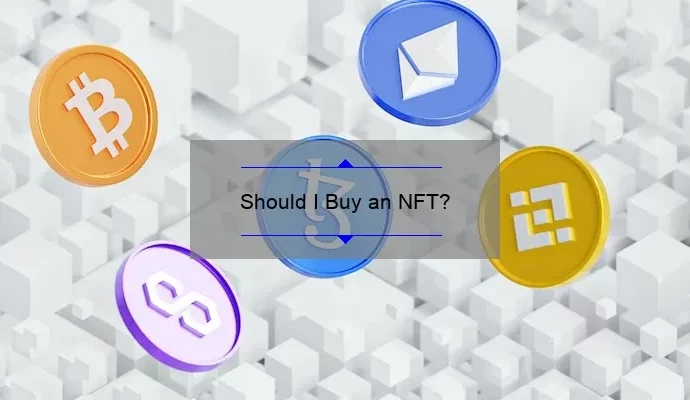Resposta curta should i buy an nft: Comprar um NFT é uma decisão pessoal que depende do seu interesse e disponibilidade financeira. Os NFTs são ativos digitais exclusivos e podem variar amplamente em termos de valor, potencial de retorno e utilidade. É importante fazer pesquisas sobre o projeto específico, sua autenticidade e relevância no mercado
Resposta curta should i buy an nft:
Comprar um NFT é uma decisão pessoal que depende do seu interesse e disponibilidade financeira. Os NFTs são ativos digitais exclusivos e podem variar amplamente em termos de valor, potencial de retorno e utilidade. É importante fazer pesquisas sobre o projeto específico, sua autenticidade e relevância no mercado antes de comprar um NFT. Considere também os riscos associados ao mercado volátil dos NFTs.
Should I Buy an NFT? Understanding the Basics and Benefits
With the rise of cryptocurrency and blockchain technology, there’s a new buzzword in town – NFT (Non-Fungible Token). You may have heard about NFTs being sold for jaw-dropping amounts, leaving you wondering if you should jump on the bandwagon too. But before impulsively diving into this digital trend, it’s important to understand the basics and benefits of buying an NFT.
First things first, let’s unravel what an NFT actually is. Unlike cryptocurrencies such as Bitcoin or Ethereum that are fungible (meaning they can be exchanged on a one-to-one basis), NFTs represent unique digital assets that cannot be replicated or replaced. In simpler terms, think of an NFT as owning a piece of digital art or collectible akin to owning a rare physical item like a valuable painting or a limited-edition comic book.
One of the key benefits of purchasing an NFT is ownership verification. Through blockchain technology, which offers transparency and immutability, every transaction related to an NFT is permanently recorded. This means that once you buy an NFT, you can prove that you own it without any doubt since the record exists on the blockchain. This has revolutionized the world of digital ownership by solving the long-standing problem of counterfeit copies.
Moreover, when you buy an NFT from an artist or creator directly, you’re supporting them directly – cutting out intermediaries and helping them receive a fair share for their work in these decentralized marketplaces. This aspect has significantly influenced artists from various domains to explore this space and showcase their talent through unique digital creations.
Now we come to the more exciting part – potential financial gains! While investing in any asset carries risks, some individuals have made monumental profits by trading NFTs. With skyrocketing price tags attached to certain tokens, speculators have managed to sell their acquired artwork or collectibles at mind-boggling sums. However, caution must be exercised as the value of an NFT can be highly volatile, and just because someone spent millions on a digital artwork does not guarantee that you will find similar success.
Beyond the financial aspect, NFTs have also opened up doors for new ways of interacting with art and culture. Creators have been experimenting with augmented reality (AR) and virtual reality (VR) technologies to enhance the experiences tied to their digital assets. Imagine being able to step into a virtual gallery where you can admire your purchased artwork or display it in your virtual living room – possibilities are virtually limitless!
Although owning an NFT comes with distinctive advantages, it’s crucial to weigh the associated risks as well. The current hype surrounding NFTs has attracted scammers who try to exploit this nascent market by creating counterfeit tokens or misleading buyers. Therefore, always exercise caution and thoroughly research before transacting or investing in an NFT.
So, should you buy an NFT? The decision ultimately rests on your personal interest, financial situation, and risk appetite. If you’re passionate about supporting artists, fascinated by digital art or collectibles, and willing to navigate this evolving space mindfully, then diving into the world of NFTs could be an exhilarating experience!
In conclusion, buying an NFT goes beyond just owning a unique digital asset; it represents a paradigm shift in ownership verification and supporting artists directly. While potential financial gains can’t be dismissed entirely, it is essential to stay informed about the market trends and make wise investment choices. With proper research and careful consideration, stepping into this novel space might unlock exciting new possibilities that bridge technology and creativity!
How Should I Buy an NFT: A Comprehensive Guide for Beginners
Title: How to Master the Art of Buying NFTs: An In-Depth Guide for Novices
Introduction:
As the digital world continues to evolve, a new trend has emerged captivating artists, collectors, and technology enthusiasts alike—Non-Fungible Tokens (NFTs). These unique digital assets have taken the art world by storm, offering unparalleled opportunities for creators and buyers. However, understanding the intricacies of buying an NFT can be daunting for beginners. Fear not! This comprehensive guide aims to equip you with all the knowledge and skills you need to confidently dive into the world of NFTs.
1. The Basics: Understanding Non-Fungible Tokens
Before embarking on your NFT buying journey, it’s crucial to grasp the fundamentals. Unlike cryptocurrencies such as Bitcoin or Ethereum, which are fungible and interchangeable, NFTs are one-of-a-kind digital assets. These tokens are built on blockchain technology ensuring authenticity, scarcity, and ownership verification.
2. Setting Up Your Digital Wallet:
To interact with NFT marketplaces effectively, you’ll need a crypto wallet that supports these unique tokens. Choose a reputable digital wallet like MetaMask or Trust Wallet and secure it with strong passwords or biometric authentication methods. Once set up, fund your wallet with some cryptocurrency (usually ETH) as it acts as the primary currency for most NFT transactions.
3. Researching Marketplaces:
Navigating through various marketplaces is vital before settling on one to make your first purchase. Popular platforms like OpenSea, Rarible, SuperRare offer vast collections from a multitude of artists across different genres—whether it’s art pieces, collectibles or even virtual real estate. Thoroughly explore each platform to discover its features, reputation within the community and any associated fees.
4. Due Diligence: Evaluating Artists and Creators
When buying an NFT artwork or collectible piece from a specific artist, it’s crucial to research their background and expertise. Look for artists with a strong portfolio, a solid reputation within the industry, and a growing community of followers. Additionally, confirm whether the creator actively engages with buyers and collectors, as this interaction may enhance the long-term value of your purchase.
5. Determining Authenticity and Scarcity:
One of the key advantages of NFTs lies in their ability to prove authenticity and scarcity. Before purchasing an NFT, verify that it has been minted by the rightful creator through exploring their official website or social media channels. Additionally, examine any associated metadata such as edition numbers or limited quantities to ensure you are investing in a unique piece.
6. Grasping Auctions vs. Direct Sales:
The process of acquiring an NFT can take different paths—either through auctions or direct sales. In auctions, multiple bidders compete for ownership until time runs out or bidding reaches its peak. On the other hand, direct sales allow for instant purchases at fixed prices set by the artists or previous owners. Consider both options carefully based on your budget and urgency to acquire specific pieces.
7. Engaging with Community & Collectors:
NFT communities are flourishing grounds for learning, networking and discovering new digital art trends. Engage actively on various platforms like Discord or Twitter communities related to your interests; participating in discussions will widen your understanding of NFTs and potentially open doors to opportunities ranging from collaborations to early access releases.
8. Storing Your NFT Collection Safely:
Once you’ve acquired your precious NFTs, safeguard them by storing them securely in appropriate wallets specifically designed for digital collectibles such as MetaMask Wallet or hardware wallets like Ledger Nano S/X. Regularly update your wallet software and maintain backups of essential credentials offline to avoid potential loss or theft.
Conclusion:
Congratulations! With this comprehensive guide under your belt, you now possess the fundamental knowledge needed to navigate the world of NFTs. Whether you’re seeking unique artworks, rare collectibles, or even virtual land, approach your NFT journey with curiosity, diligence, and a staunch appreciation for digital art. As the market continues to evolve rapidly, stay engaged within communities and remain at the forefront of emerging trends—you might just be on your way to becoming an esteemed NFT collector yourself!
Should I Buy an NFT? Step-by-Step Process for Making Informed Decisions
Title: Should I Buy an NFT? A Step-by-Step Process for Making Informed Decisions
Introduction:
In the ever-evolving digital world, Non-Fungible Tokens (NFTs) have taken center stage as a new and exciting way to buy, sell, and own unique digital assets. From artwork and collectibles to music and virtual real estate, the possibilities seem endless. However, before diving headfirst into this trend, it’s crucial to approach the decision with diligence and careful consideration. In this article, we will guide you through a step-by-step process that will help you make informed decisions about whether or not buying an NFT is right for you.
1. Understand NFTs:
Begin by educating yourself about Non-Fungible Tokens. Familiarize yourself with what they are – digital assets representing ownership of something unique – and how they differ from cryptocurrencies like Bitcoin or Ethereum. Gain insights into how NFTs utilize blockchain technology to ensure transparency and traceability.
2. Define Your Purpose:
Ask yourself why you are interested in purchasing an NFT. Are you primarily attracted to art? Looking for investment opportunities? Or perhaps supporting your favorite creators? Clearly identifying your purpose will help guide your decision-making process and avoid impulsive purchases.
3. Research Artists/Creators/Projects:
Once you’ve established your purpose, research artists, creators, or projects that align with your interests. Look into their backgrounds, past works/projects, reputation in the art world or relevant communities.
4. Evaluate Authenticity & Scarcity:
Uniqueness is a core element of NFTs; hence authenticity is vital. Verify if the platform certifies the originality of each token through authentication processes such as metadata verification or artist signatures. Assess scarcity as well – rarer assets typically hold more value within the market.
5. Consider Longevity & Value Retention:
Investigate whether the NFT you intend to purchase has a long-term value proposition. Evaluate aspects like the historical performance of similar works from the artist/creator, market demand for their pieces, and any potential partnerships or collaborations that could enhance the value over time.
6. Assess Ownership Rights & Usage:
Understand what rights are associated with owning an NFT and how you can use or display it. Some NFTs come with additional perks such as future access to exclusive content or experiences; evaluate these aspects to ensure they align with your expectations.
7. Determine Your Budget:
Set a clear budget for your NFT purchase. Consider both the upfront cost and additional expenses like transaction fees on blockchain networks. Be cautious not to overspend or invest more than you can afford.
8. Select a Reliable Marketplace:
Choose a reputable marketplace to buy your desired NFTs. Look for platforms that have established themselves in the industry, prioritize security measures, offer user-friendly interfaces, and have positive feedback from buyers and sellers.
9. Exercise Due Diligence While Buying:
Before finalizing any transaction, carefully review all details provided by the seller: ownership history, authenticity certificates, description, terms of sale (including any royalties involved), and potential hidden costs. Ensure you are fully satisfied before proceeding.
10. Store & Protect Your Investment:
Once you own an NFT, secure it properly to prevent any loss or theft. Consider using offline wallets or reliable digital asset storage solutions while ensuring regular backups of your private keys.
Conclusion:
In conclusion, venturing into the world of NFTs requires a thorough decision-making process rather than merely following trends blindly. By following this step-by-step guide and conducting diligent research at each stage, you can make informed decisions about purchasing an NFT that aligns with your interests and goals while avoiding unnecessary risks along the way.
Exploring Common Concerns: Should I Buy an NFT? Frequently Asked Questions
Title: Exploring Common Concerns: Should I Buy an NFT? Frequently Asked Questions
Introduction:
As the world of digital art continues to evolve, a new term has been making waves in recent times – NFTs (Non-Fungible Tokens). With famous artists and collectors embracing this digital revolution, you might be wondering whether it’s time for you to dive into this trend. In this blog, we will address some common concerns and answer frequently asked questions to help you decide if buying an NFT is right for you.
Question 1: What exactly is an NFT?
An NFT, or Non-Fungible Token, is a unique piece of digital content that utilizes blockchain technology to prove its authenticity and ownership. It can be anything from artwork, music, videos, or even memes. Unlike cryptocurrencies such as Bitcoin or Ethereum that are fungible (interchangeable), each NFT possesses distinct qualities making it one-of-a-kind.
Question 2: How does owning an NFT differ from owning physical art?
Owning traditional physical art gives you a tangible object to enjoy and display. However, with NFTs, ownership lies in the digital realm. This means that you have exclusive rights over a particular piece of art but do not possess a physical manifestation of it. Think of it as having a unique key to access and authenticate the digital representation of the artwork.
Question 3: Are all NFTs expensive?
Contrary to popular belief, not all NFTs come with hefty price tags. While some high-profile sales grab headlines due to their multimillion-dollar figures, there are plenty of affordable options available for enthusiasts at various budget levels. Furthermore, exploring emerging artists’ work could present excellent opportunities for investment without breaking the bank.
Question 4: But how can something digital be valuable?
The value associated with an NFT revolves around its scarcity and demand within the market. Similar to physical art, scarcity enhances desirability and drives up prices. Additionally, owning an NFT allows you to support artists directly since they typically retain royalty rights for future sales. Moreover, digital art’s inherent uniqueness and immutability through blockchain technology add an extra layer of value and provenance.
Question 5: What about copyright infringement? Can anyone claim ownership?
An NFT represents proof of ownership but does not necessarily address copyright or intellectual property rights. Creators minting their work as NFTs should ideally hold the rights to the content they sell. However, it is crucial to thoroughly research the artist’s credibility and potential legal implications before purchasing an NFT.
Question 6: How can I ensure the authenticity of an NFT?
The blockchain technology underlying NFTs ensures transparency and proof of authenticity. Each transaction is recorded on a decentralized ledger permanently, making it nearly impossible to tamper with or counterfeit. It is essential, however, to verify that the platform or marketplace you choose has a solid reputation for hosting genuine artworks.
Conclusion:
Purchasing an NFT can be seen as contributing to a groundbreaking movement where creators have new ways of monetizing their digital creations while enthusiasts get access to unique pieces of art in a rapidly evolving landscape. By addressing these frequently asked questions and concerns related to buying NFTs, we hope you now have a better understanding of what this exciting world entails and can make informed decisions regarding your own involvement in it.
Evaluating the Risks and Rewards of Buying NFTs: Is It Worth it?
Title: Evaluating the Risks and Rewards of Buying NFTs: Is It Worth It?
Introduction:
In recent years, Non-Fungible Tokens (NFTs) have taken the digital world by storm. These unique digital assets provide a way for artists, creators, and collectors to buy, sell, and trade rare digital content. From artwork and GIFs to digital trading cards and virtual real estate, NFTs have opened up new avenues for creativity and investment opportunities. However, as with any emerging market, it is essential to evaluate the risks and rewards associated with buying NFTs before diving headfirst into this exciting but potentially volatile arena.
The Promise of NFTs:
At its core, an NFT is a blockchain-powered token that represents ownership or proof of authenticity for a specific piece of digital content. This technology has enabled artists to monetize their work directly without relying on intermediaries like galleries or auction houses. For collectors, owning an NFT provides exclusive access to limited-edition creations from renowned artists or emerging talents.
1. The Rewards:
a) Authenticity and Provenance: When you purchase an NFT, you obtain indisputable evidence of your ownership rights attached to a particular digital asset. This permanent record within the blockchain ensures authenticity, making it highly appealing in the art world where proving provenance is crucial.
b) Digital Art Market Accessibility: With traditional artwork often confined within physical spaces like galleries or private collections, the sale of these pieces can be exclusive and limited by geography or connections. In contrast, NFTs open doors for artists worldwide by providing wider accessibility through online platforms such as Ethereum’s OpenSea or Rarible.
c) Potential Value Appreciation: Like other speculative markets such as stocks or cryptocurrencies, investing in certain high-demand NFTs may yield substantial returns over time if demand continues to increase. Rare collectibles from established artists or viral sensations have been known to fetch significant sums at auctions, creating opportunities for investors to profit from their investments.
2. The Risks:
a) Market Volatility: The NFT market is relatively new and evolving rapidly, making it susceptible to sudden peaks and crashes. Prices for certain digital assets can soar to unimaginable heights due to hype or celebrity involvement but may experience a sharp decline when interest wanes. Buyers must be cautious and prepared for fluctuations in value.
b) Lack of Regulation: As the NFT market operates largely on decentralized blockchain platforms, it remains largely unregulated by standard industry practices or governmental oversight. This lack of regulation can lead to fraudulent activities, plagiarism, disputes over ownership rights, or even potential scams. Diligence is required when dealing with lesser-known artists or platforms.
c) Environmental Concerns: The current popularity of NFTs has raised concerns about their environmental impact. Blockchain transactions typically consume significant amounts of electricity, leading critics to question the sustainability aspect of this technology. It’s crucial for both buyers and creators alike to consider these implications and support eco-friendly initiatives within the NFT space.
Conclusion:
The decision to invest in NFTs ultimately boils down to an individual’s risk appetite, financial standing, and personal interests within the digital art ecosystem. While there are undeniable rewards associated with owning rare digital assets that offer both aesthetic pleasure and potential financial gains, one must tread cautiously in this dynamic marketplace.
Before diving into the world of NFTs headfirst, potential buyers should carefully research the artists they are interested in supporting as well as vetting the credibility and reputation of the platforms they intend to use. Understanding the risks and rewards associated with buying NFTs will allow investors to make informed decisions that align with their goals while contributing positively towards shaping this exciting new avenue for creativity and investment.
Should I Buy an NFT as an Investment? Factors to Consider and Expert Opinions
Should I Buy an NFT as an Investment? Factors to Consider and Expert Opinions
In recent years, the world of digital assets has witnessed an unprecedented boom with the rise of non-fungible tokens (NFTs). These unique, indivisible tokens have taken the art, music, and gaming industries by storm, offering a new medium for creators to monetize their work. But with all the hype surrounding NFTs, many investors are left wondering: should I buy an NFT as an investment? Let’s delve into this question by considering various factors and seeking expert opinions.
One crucial factor to consider before diving into the world of NFTs is your level of familiarity with blockchain technology. NFTs are built on blockchain platforms like Ethereum, making them inherently linked to cryptocurrencies. If you’re comfortable navigating crypto wallets and trading on decentralized exchanges, you may find it easier to enter the NFT market. However, if terms like “blockchain” and “smart contract” sound foreign to you, it might be best to educate yourself more thoroughly before venturing into this space.
Another critical aspect worth analyzing is your risk tolerance. As with any investment, there are inherent risks associated with buying NFTs. The volatility of their prices can sometimes resemble rollercoaster rides – skyrocketing one day and plummeting the next. Purchasing an NFT should not be seen solely as a financial investment but also as supporting artists or creators whose work resonates with you personally. It’s crucial to approach NFT buying with both passion and caution.
Expert opinions can provide invaluable insights when considering whether or not to invest in NFTs. Some experts argue that investing in blue-chip artwork or traditional collectibles may be a safer bet due to their historical track records and established markets. However, proponents of NFTs believe they offer unparalleled opportunities for artists due to increased ownership rights and potential royalties from secondary sales facilitated by smart contracts.
One expert opinion to consider is that of Gary Vaynerchuk, a well-known entrepreneur and digital marketing guru. Vaynerchuk sees NFTs as the future of intellectual property ownership but advises investors to be discerning in their choices. He suggests researching the artist’s background, evaluating their previous work, and considering whether they have a long-term career trajectory before investing in their NFTs.
On the other hand, renowned art critic Jerry Saltz has expressed concerns about NFTs’ potential bubble-like qualities and fraudulent practices within the space. He warns that not all NFTs will retain or gain value over time. Saltz advises buyers to approach NFT purchases like acquiring any other artwork, emphasizing personal connection and aesthetic appeal rather than solely considering financial gains.
Furthermore, it’s essential to consider legal implications when investing in NFTs. The legal framework surrounding intellectual property rights and ownership can still be murky within this emerging economy. Ensuring that you understand the terms of ownership attached to an NFT and any potential pitfalls is crucial to protecting your investment.
In conclusion, whether you should buy an NFT as an investment depends on various factors such as your familiarity with blockchain technology, risk tolerance, personal interest in supporting creators, and expert opinions from professionals like Gary Vaynerchuk or Jerry Saltz. Careful consideration must be given to the volatility of prices associated with these unique digital assets and awareness of any legal ramifications tied to ownership rights. Ultimately, approaching NFT investments holistically by balancing passion for art with financial prudence can result in satisfying experiences within this rapidly evolving industry.
Sources:
– NPR: www.npr.org
– The New York Times: www.nytimes.com
– CNBC: www.cnbc.com
 FraternIdadecrypto
FraternIdadecrypto 



















